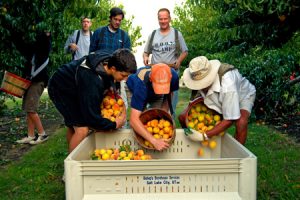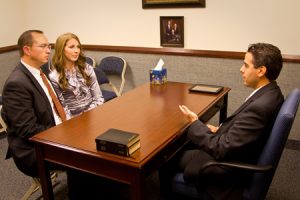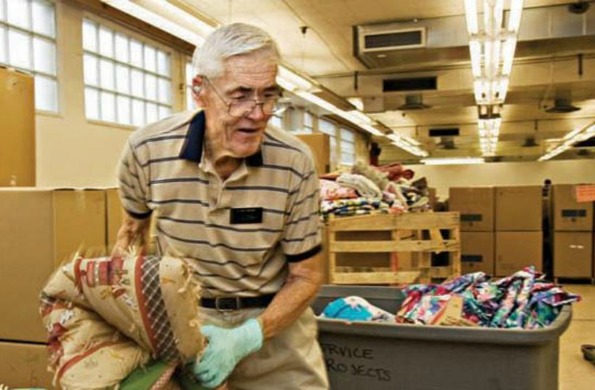Sometimes, when a caring person looks around and sees how much need there is in the world, he can become discouraged. It might seem like it’s hardly worth helping, when your help would barely even touch the hardship the world is facing. A person who can afford to give only three cans of soup to a food bank might wonder if those three cans could make any difference at all when so many are hungry.
 There is an often told tale of a man tossing starfish back into the ocean. Starfish that become stranded on the beach will die. A young man comes along and watches the older man for a few minutes. He looks around the beach at the hundreds and hundreds of stranded starfish lying on the beach and knowing the older man can’t possibly rescue them all, asks, “Why do you bother? It’s not going to make a difference.”
There is an often told tale of a man tossing starfish back into the ocean. Starfish that become stranded on the beach will die. A young man comes along and watches the older man for a few minutes. He looks around the beach at the hundreds and hundreds of stranded starfish lying on the beach and knowing the older man can’t possibly rescue them all, asks, “Why do you bother? It’s not going to make a difference.”
The older man picks up another starfish and throws it into the water. He turns to the younger man and says gently, “It made a difference to this one.”
There is a quote on my desk from Gordon B. Hinckley, the previous president of The Church of Jesus Christ of Latter-day Saints. It says, “I believe in the principle that I can make a difference in this world. It may be ever so small. But it will count for the greater good. The goodness of the world in which we live is the accumulated goodness of many small and seemingly inconsequential acts.” (Gordon B. Hinckley, “I Believe,” Ensign, Aug 1992, 2)
Our three cans of soup might not do very much to end hunger. However, our three cans of soup might feed six people. Then, if our neighbor also contributed three cans of soup, twelve people would be fed. If enough people donated soup, and all the other foods necessary to sustain life, no one would be hungry. The accumulated donations would be enough to take care of everyone who needed them, even though ours alone can’t make a dent in the problem.
In order for this to work, though — in order to be sure everyone who is hungry gets fed, and everyone who needs a place to live has one — everyone has to help. This doesn’t mean we can all sit around and wait for a handout. It does mean that those who have done the best they can do and still can’t quite make it will receive what they need. Anyone could unexpectedly find himself in a situation where he is dependent on others for his well-being. No one is immune from hardship. If we’ve helped others, we’ve earned the right to be helped without feeling guilty when we’ve truly exhausted our other resources.
The Church has a number of programs designed to help make our small contributions count for the greater good. One such program is the bishop’s storehouse. The storehouse resembles a small grocery store with one big exception — there is no cash register.
 Members of the Church meet with their local church leaders to evaluate whether or not the member has done everything in his power to take care of himself. Has he cut his expenses down, and gotten rid of luxuries? The Church doesn’t help people maintain their lifestyles. It only helps them live. This means if a member wanted food assistance, but was keeping up a gym membership and a nice boat, he would be turned down.
Members of the Church meet with their local church leaders to evaluate whether or not the member has done everything in his power to take care of himself. Has he cut his expenses down, and gotten rid of luxuries? The Church doesn’t help people maintain their lifestyles. It only helps them live. This means if a member wanted food assistance, but was keeping up a gym membership and a nice boat, he would be turned down.
The church leaders would also help the member learn to live more frugally if necessary. Then, when they were determined to be eligible for help, they would be able to fill out, with help from a leader, a form that lists all available food and personal care items available. They’d select what they need and go to the storehouse every other week to pick it up.
A member receiving this help would be encouraged to “pay” for it with work that might not entirely cover the cost, but would be tailored to that person’s individual circumstances. A member might come to the church building on Saturday evening to help clean it for the next day’s services, or mow lawns for elderly church members. Those who can come early to the storehouse and work there for an hour or two before filling their order. This maintains a person’s self-respect and dignity, because he’s not taking charity.
The money for this program comes from other Latter-day Saints, who go without food for twenty-four hours (typically from the first Saturday evening of the month until the following Sunday evening). They skip two meals this way and then donate at least the amount they saved by not eating, drinking, or snacking during this time to a special fund called a Fast Offering.
All the money from this fund goes to care for those in need. This allows the person who could normally only afford to donate two cans of soup to donate more once a month. Again, while the amount of money saved from two meals might not be a lot, when combined with the money from all the other skipped meals, it feeds and cares for a great many people around the world.
Each Latter-day Saint congregation has a Relief Society, an organization dedicated to serving and helping women. This Relief Society has a woman assigned to be the “compassionate service leader” for her congregation, working with assistants if needed.
 The compassionate service leader makes certain the needs of the congregation are met in terms of service. For instance, a grieving family will receive meals for a few days from members of the church. A woman with a broken leg might driven to the doctor by another woman, and a single mom with a critical job interview might have her children watched while she’s away. In this case, the accumulated goodness is in the form of time, rather than money. Not all needs can be met with money, and members of The Church of Jesus Christ of Latter-day Saints are taught to respond to those needs with their own time and resources.
The compassionate service leader makes certain the needs of the congregation are met in terms of service. For instance, a grieving family will receive meals for a few days from members of the church. A woman with a broken leg might driven to the doctor by another woman, and a single mom with a critical job interview might have her children watched while she’s away. In this case, the accumulated goodness is in the form of time, rather than money. Not all needs can be met with money, and members of The Church of Jesus Christ of Latter-day Saints are taught to respond to those needs with their own time and resources.
The Savior Jesus Christ taught us to serve each other. He told the story of a time He was hungry and homeless, but was neither fed nor sheltered, and turned away. When His followers wanted to know when they had done that, He reminded them that what they do to others is what they do to the Savior. When we feed a hungry person or help someone otherwise in need, it’s a gift to Jesus Christ.
We may not be able to change the world alone, but when we combine our small but loving efforts with those of others, the world does indeed change.
This post was originally published in 2009. Minor changes have been made.
About Terrie Lynn Bittner
The late Terrie Lynn Bittner—beloved wife, mother, grandmother, and friend—was the author of two homeschooling books and numerous articles, including several that appeared in Latter-day Saint magazines. She became a member of the Church at the age of 17 and began sharing her faith online in 1992.





